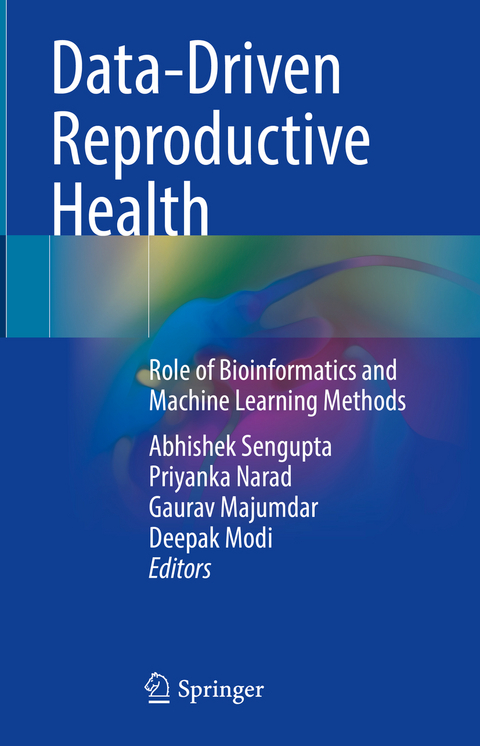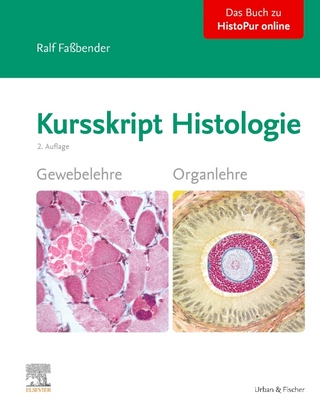
Data-Driven Reproductive Health
Springer Nature (Verlag)
978-981-97-7450-0 (ISBN)
This book provides insight into the transformative impact of data-driven approaches on reproductive health. Chapters cover a wealth of intricate algorithms of genomic analysis, predictive modeling, and personalized treatment strategies, providing an up-to-date view of the reproductive healthcare landscape. With more than 20 code-based examples, the book decodes complex biological data using bioinformatics and machine learning and provides valuable insights into fertility, genetic disorders, and personalized medicine.
This book is relevant for healthcare professionals, researchers, and students in the fields of reproductive medicine, bioinformatics, and genetics.
Dr. Abhishek Sengupta is working as an assistant professor at the Centre for Computational Biology and Bioinformatics, Amity Institute of Biotechnology, Amity University, Noida, India. He completed his Ph.D. on the topic 'modelling and analysis of human energy metabolic network,' with a completely annotated model titled HEPNet: Human Energy Pool Network from Amity University, Noida, India. Dr. Sengupta is associated with a DBT-funded project on “AI in reproductive medicine” at the research lab located at the Amity Institute of Biotechnology, Noida, India. His lab focuses on projects employing multi-omics and machine learning approaches for reproductive health research. Some of the research projects from his lab are on the genital microbiome, endometrium transcriptomics, and viral/fungal infections with an emphasis on investigating, analyzing, and predicting pregnancy-related complications, recurrent implantation failure, IVF outcomes, STIs, and PCOS, as well as identify novel therapeutic targets and drugs. He has published many papers in peer-reviewed national and international journals. Dr. Priyanka Narad is currently working as Scientist in Indian Council of Medical Research, New Delhi and previously worked as an assistant professor at the Centre for Computational Biology and Bioinformatics, Amity Institute of Biotechnology, Amity University, Noida, India. She completed her Ph.D. in network biology and constructed a network of molecular complexities in various phases of human stem cells, with an emphasis on the induction and maintenance of human embryonic stem cells from Amity University, Noida, India. Dr. Narad along with Dr. Sengupta worked on a DBT-funded project on “AI in reproductive medicine” at the research lab located at the Amity Institute of Biotechnology, Noida, India. Some of the research projects from her lab are on the genital microbiome, endometrium transcriptomics, and viral/fungal infections with an emphasis on investigating, analyzing, and predicting pregnancy-related complications, recurrent implantation failure, IVF outcomes, STIs, and PCOS, as well as identify novel therapeutic targets and drugs. She has published many papers in peer-reviewed national and international journals. Dr. Gaurav Majumdar is the chief embryologist at the Centre of IVF, Sir Ganga Ram Hospital, New Delhi, India. He completed his master's in clinical embryology from the National University of Singapore, Singapore; Ph.D. in pre-implantation genetic screening in human embryos. Dr. Majumdar has published many papers in peer-reviewed national and international journals and several chapters. Dr. Deepak Modi is a scientist at the ICMR-National Institute for Research in Reproductive Health and leads the molecular and cellular biology group. He completed his M.Sc. Zoology and Ph.D. in applied biology from the University of Mumbai, Mumbai, India. Dr. Modi’s areas of interest include understanding endometrial receptivity and endometrial disorders, genetics of sexual development, male infertility and COVID-19, and reproduction. He has received many awards.
1 Introduction to Data Mining in Reproductive Health.- 2 Reproductive Health Data Sources.- 3 Pre-processing and Integration of Reproductive Health Data.- 4 Multi-omics Approaches for Reproductive Health Data.- 5 Association Rule Mining in Reproductive Health Data.- 6 Modeling in Reproductive Health and Treatment Outcomes.- 7 Clustering Analysis of Reproductive Health Data.- 8 Text Mining and NLP in Reproductive Health.- 9 Time Series Analysis in Reproductive Health Data.- 10 Data Mining Ethics in Reproductive Health.- 11 Reproductive Health Data Mining: Case Studies.- 12 Future Directions and Emerging Trends in Reproductive Health.
| Erscheinungsdatum | 13.11.2024 |
|---|---|
| Zusatzinfo | 23 Illustrations, color; 2 Illustrations, black and white; XI, 231 p. 25 illus., 23 illus. in color. |
| Verlagsort | Singapore |
| Sprache | englisch |
| Maße | 155 x 235 mm |
| Themenwelt | Medizin / Pharmazie ► Gesundheitsfachberufe ► Hebamme / Entbindungspfleger |
| Medizin / Pharmazie ► Medizinische Fachgebiete ► Gynäkologie / Geburtshilfe | |
| Studium ► 1. Studienabschnitt (Vorklinik) ► Histologie / Embryologie | |
| Schlagworte | Artificial Intelligence in Reproductive Health • Bioinformatics and Multi-Omics Approaches in Reproductive Health • Computational Intelligence in Reproductive Health • Data-driven Healthcare in Reproductive Health • Data Mining in Reproductive Health • Machine Learning in Reproductive Health • Natural Language Processing (NLP) in Reproductive Health • Personalized Medicine in Reproductive Health • Population Studies in Reproductive Health • Predictive Modeling in Reproductive Health • Time Series Analysis in Reproductive Health |
| ISBN-10 | 981-97-7450-0 / 9819774500 |
| ISBN-13 | 978-981-97-7450-0 / 9789819774500 |
| Zustand | Neuware |
| Haben Sie eine Frage zum Produkt? |
aus dem Bereich


